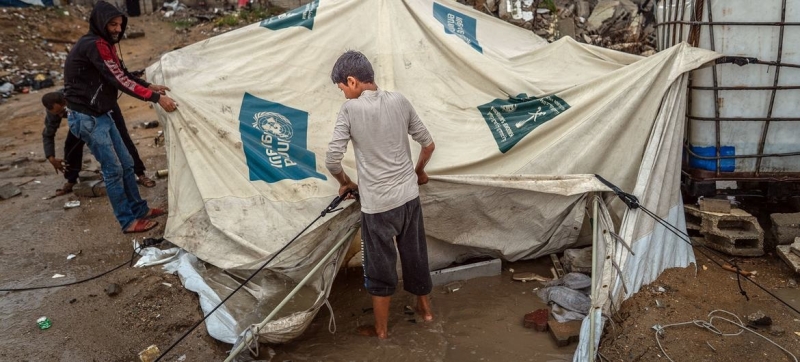- Tk 500cr Drive to Turn Haor Fallow Land Into Farmland |
- Tarique Rahman returns home amid rapturous reception |
- Home After 17 Years: Tarique Returns to Gulshan Residence |
- Tarique Calls for United Effort to Build a Safe Bangladesh |
- Tarique leaves for 300 feet area from airport |
Gaza Children Face Winter Hardship Despite Security Council Deal

As UN Secretary-General António Guterres welcomed Monday’s Security Council resolution paving the way for a consolidated ceasefire via a temporary International Stabilization Force in Gaza, UN aid teams warned that many Palestinian children in the enclave are ill-prepared to endure another harsh winter.
“We’re very optimistic that the peace plans will improve the situation,” UN Children’s Fund (UNICEF) spokesperson Ricardo Pires said in Geneva on Tuesday. “But the reality for children on the ground remains very tragic.”
“We’re still in the hypotheticals,” UN aid coordination office (OCHA) spokesperson Jens Laerke said regarding the Security Council resolution on the US peace plan, stressing that it “needs some meat on the bones,” while noting the UN chief’s support for the initiative.
The resolution endorsing the “Comprehensive Plan to End the Gaza Conflict” announced by US President Trump on 29 September received backing from 13 Security Council members, with China and Russia abstaining.
A Board of Peace
The resolution welcomes the transitional administration known as the “Board of Peace,” reportedly chaired by President Trump, to establish a temporary international force in Gaza and coordinate reconstruction, including humanitarian aid delivery.
In a statement issued overnight, the UN Secretary-General urged all parties to respect the fragile ceasefire, sparked by Hamas-led attacks in Israel on 7 October 2023. Guterres also acknowledged the “continued diplomatic efforts” of Egypt, Qatar, Türkiye, the United States, and regional neighbors and stressed the importance of moving toward the second phase of the US plan, leading to a political process for a two-State solution in line with previous UN resolutions.
Exposed to More Hardship
In Gaza, aid agencies highlighted on Tuesday that over two years of destructive conflict and chronic shortages of assistance have left residents exhausted.
Recent heavy rains have inundated worn-out tents sheltering people displaced multiple times during the war, Pires said. “Children sleeping in flooded tents without warm clothing or dry bedding, many lacking proper nutrition and already traumatized, face extreme winter risks.”
The UNICEF officer noted that more than 50% of the enclave is under Israeli occupation, forcing Palestinians into coastal areas most prone to flooding.
Zikim Aid Boost
Pires stressed the need for greater humanitarian access, calling it “part of the [peace] deal.” According to OCHA, over 5,400 metric tonnes of aid were collected from Thursday to Sunday, including shelter, medical, and food items. The Zikim border crossing reopened after two months, bringing available crossings to three.
UNICEF recently brought 96 pallets of high-energy biscuits for famine-stricken northern Gaza. “We need more, a lot more,” Pires said. “Hopefully, the new plan will make that possible for children and families.”

